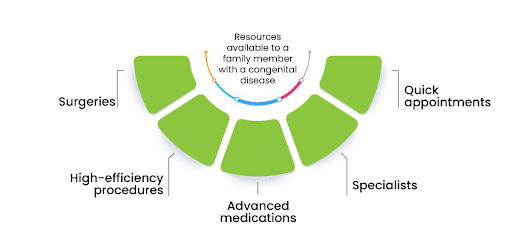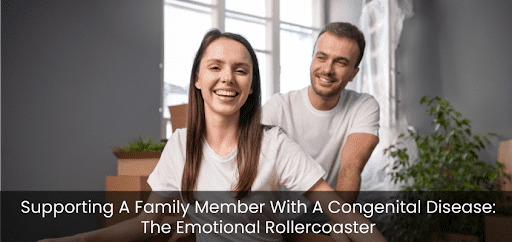Introduction
A family is one of the best blessings of life. It is a recipe for ensuring a happy life. However, when we learn that a family member has a congenital disease, it ruins the family’s state of bliss. It is a disease that starts at birth but can often come to light later in life. When it does, the joy of family life transforms into a challenge to provide the best possible care to the bedevilled member.
Such patients with congenital diseases require specialised health care facilities. It becomes essential for family members to gain knowledge in this regard.
Observing a member can be overwhelming for family members. It is not uncommon for them to undergo different feelings and emotions.
During such a phase, never consider yourself to be lonely. You will find many resources at your disposal that can provide the utmost care to your kinfolk suffering from a congenital disease.
Our Wellness Programs
What is an emotional rollercoaster ride to deal with a family member with a congenital disease?
Dealing with a family member with a congenital disease leads to an emotional rollercoaster ride. Be prepared and strap yourself for the ride if this happens to you. You will be going through a passage of emotions, including sadness, fear, guilt, confusion, hope, and happiness.
Looking for services related to this subject? Get in touch with these experts today!!
Experts

Deepti Gandhi

India
Life Coach
Experience: 6 years

Ritu Singh

India
Life Coach
Experience: 16 years

Banani Das Dhar

India
Wellness Expert
Experience: 7 years
What are the effects when a family member suffering from a congenital disease?
Sadness strikes after family members learn their beloved has a congenital disease. Fear and panic can enter, throwing everyday lives out of balance. Long periods of sadness and fear give rise to guilt. Here, family members resort to self-blaming. They may begin to think all of this is somehow their fault, even if it sounds irrational. All this can give rise to confusion and a loss of confidence.
- Confusion can take the following forms:
- Questioning reality.
- How do you make the congenital patient happy?
- What treatment to secure?
- Which medical expert to see?
- How to divide time between work and family?
- What activities can be harmful to the patient?

What are resources available to a family member with a congenital disease
Thankfully, there are plenty of resources available for family members to help their beloved ones in the modern era. Such resources are as follows:
- Surgeries.
- High-efficiency procedures.
- Specialists.
- Quick appointments.
- Advanced medications.
After learning of these resources, family members begin to see a ray of hope. Their hopes rise as the treatment progresses. Finally, their emotions are happy when the treatment delivers positive results; the patient shows signs of recovery.
Family Member With Congenital disease has nothing to do with sin.
As discussed above, family members of patients with congenital diseases can exhibit self-guilt. One form this self-guilt may take is to associate the condition with the concept of sin. The basis of their belief depends on the factors such as irrationality, illogical assumptions, delusion, paranoia, fear, and confusion.
Family members may generate this false idea that what’s happening to the diseased member results from their sinful behaviour. It negatively affects the emotional well being of the family. Do the following to avoid thinking like this:
- Talk to other families who underwent similar experiences. Ask them if they felt self-guilt and how they coped with it.
- Always reason, no matter how challenging the circumstances may be. Look for a scientific explanation to counter such baseless thinking. This way, you will be able to avoid associating the disease with sin.
- Understand that these conditions even befall those known for their righteousness.
To do all the above, you must have a logical mindset. However, it is easy to say but challenging to do, especially in emotionally distressing times. Undergoing psychological counselling can help you realise that the disease has nothing to do with sin.
What are Five things to boost your mood when a family member with a congenital disease
The following five pointers would hopefully ensure the emotional well being of the family:
- Acknowledge emotions: Families of patients with congenital diseases tend to undergo a variety of emotions like grief, anger, denial, shock, sadness, guilt, etc. The best way to deal with them is to acknowledge these feelings. Talking with a psychologist can help in this acceptance process.
- Cherish each moment: Enjoy every moment with your beloved as any family member would. Talk and laugh, being nonchalant about the disease. It encourages the mental well being of both the patient and the family members.
- Psychological counselling: Undergoing psychological counselling is one of the best ways to clear the mind’s negativities and see things positively. Alternatively, one can join a support group to share emotional experiences with others.
- Focus on the positive: Research indicates that regularly expressing gratitude for life’s blessings helps boost mental happiness. No matter how hard life gets, there are many blessings to appreciate. Start counting them, maybe even write them down, and focus on them.
- Meditation: Meditation in the sunshine is a great way to brighten up the mood. Regularly devoting even half an hour to outdoor meditation can do wonders for your mental well being.
What is the exciting fact about cancer cells?
Here is an interesting fact- We all have cancer cells. You read it right; our bodies have cancer cells. Body cells constantly undergo a process of multiplication. Due to this, there will be some mutated cells that could be cancerous. In most cases, the body can remove or eliminate them. However, sometimes the cancerous cells can lead to cancer when:
- The body fails to identify the cancerous cells as a threat.
- The body cannot eliminate cancerous cells.
It shows that we are not so different from our loved ones with any congenital disease. It also shows the uncertainty of our human lives. So, no one should think that what’s happening to them is unique. Life is full of challenges, and everyone has to face them, one way or another.
Conclusion
A congenital disease is a health problem inborn since infancy. It can manifest early or later in life. Whenever it does, it brings about a disaster in the lives of parents or family members. Family members and the patient go through various emotions — sadness, fear, guilt, confusion, hope, happiness — rightly termed an emotional rollercoaster experience.
An important thing to do here is to reason. One must not be a victim of unscientific notions like associating the disease with sin or self-guilt. Also, family members must develop a logical mindset to deal with this supportively. Besides this, various measures are available for improving the family’s emotional well being.
For more information on mental health, you may visit United We Care.
















